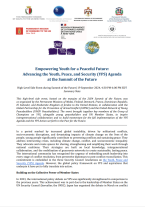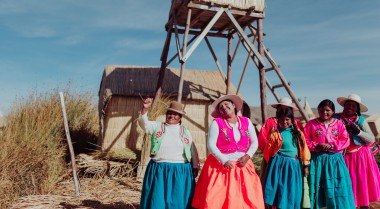Empowering Youth for a Peaceful Future: Advancing the Youth, Peace, and Security (YPS) Agenda at the Summit of the Future
In a period marked by increased global instability, driven by militarised conflicts, socio-economic disruptions, and devastating impacts of climate change on the lives of the people, young people significantly contribute to preventing conflicts and sustaining peace. They address intersecting crises, including climate change, conflict, and socioeconomic inequality. They advocate and create spaces for sharing, strengthening and amplifying their work through national coalitions. Their strategies are built on local knowledge, intergenerational collaboration, and the mobilisation of grassroots networks to create sustainable, lasting peace. The international community has recognised the urgency of embedding youth leadership into every stage of conflict resolution, from preventive diplomacy to post-conflict reconciliation. This commitment is embedded in the three Security Council resolutions on the Youth, Peace and Security (YPS) Agenda. However, the global policy framework on YPS and aspirations that underpin it have yet to fully translate into action.
The following recommendations could be considered by Member States in their efforts to implement the Pact for the Future and the 2025 BAR and the 10th Anniversary of the YPS Agenda in 2025.
The Group of Champions on YPS should consider:
- systematically engaging with young peacebuilders in co-developing plans for Member States’ strategic collective and individual engagement.
- discussing the proposed YPS language that was not included in the final document of the Pact for the Future
Member States could consider:
- continuing to bring the YPS Agenda as a priority on the PBC and UNSC Agenda, integrating YPS principles into mandates of peacekeeping missions and peace operations, as well as in the Council’s prevention efforts.
- dedicating quality financial support for the work of young peacebuilders. Such support could be provided through Member States’ bilateral support or out of their national budgets.
- providing in-kind political and technical support to young peacebuilders.
- adopting fully-funded regional and national YPS action plans and strategies, in line with the commitment made in the Pact for the Future (A/RES/79/1, para 41(b)).
All international stakeholders should consider:
advancing the professionalisation of peacebuilding to ensure that the engagement of young people goes beyond volunteerism and provides adequate professional opportunities for young people.
not confining youth engagement to the topic relevant to YPS but across all of the thematic issues on their respective agendas. It is very important to engage youth actors across all global policy topics, including climate change
prioritising intergenerational dialogue mechanisms for action. Youth advisory councils or boards within governments and their embassies could be a good practice.
- investing in young people's mental health. Mental health and psychosocial support come in, creating an environment where young people can constructively engage in peace processes.
The summary note is based on a side event, hosted on the 19th of September 2024 on the margins of the 2024 Summit of the Future. It was co-organized by the Permanent Missions of Malta, Finland Denmark, France, Dominican Republic, El Salvador, and Hashemite Kingdom of Jordan to the United Nations, in collaboration with the Global Partnership for the Prevention of Armed Conflict (GPPAC) and the United Network of Young Peacebuilders (UNOY Peacebuilders). The event brought together key members of the Group of Champions on YPS, alongside young peacebuilders and UN Member States, to inspire intergenerational collaboration and to build momentum for the full implementation of the YPS Agenda and the YPS Action set forth in the Pact for the Future.



